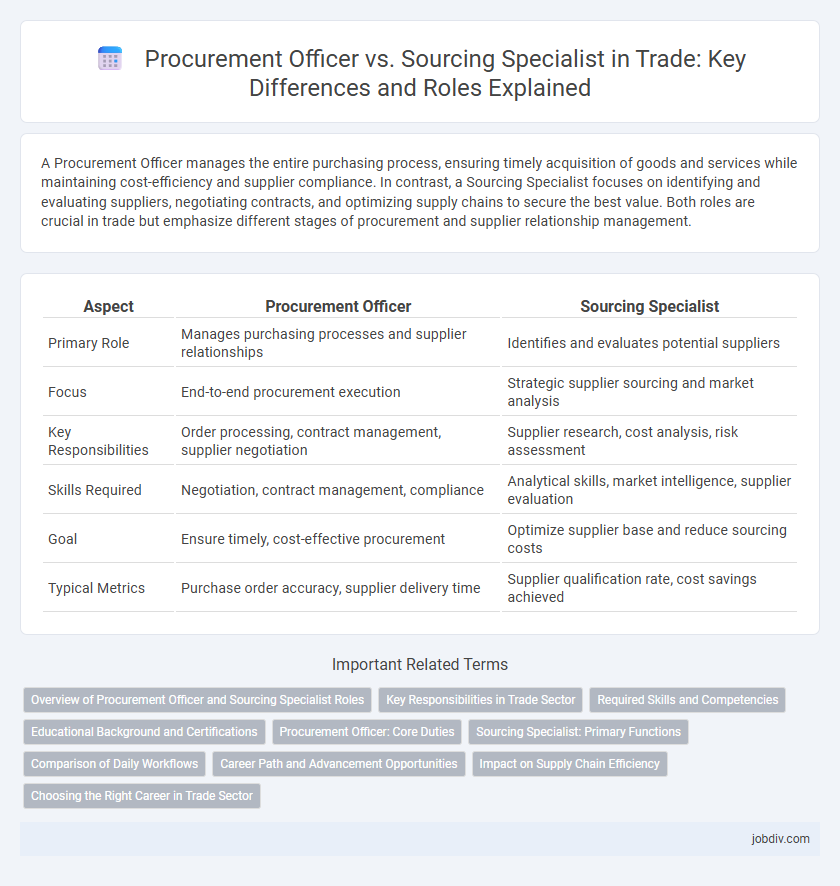A Procurement Officer manages the entire purchasing process, ensuring timely acquisition of goods and services while maintaining cost-efficiency and supplier compliance. In contrast, a Sourcing Specialist focuses on identifying and evaluating suppliers, negotiating contracts, and optimizing supply chains to secure the best value. Both roles are crucial in trade but emphasize different stages of procurement and supplier relationship management.
Table of Comparison
| Aspect | Procurement Officer | Sourcing Specialist |
|---|---|---|
| Primary Role | Manages purchasing processes and supplier relationships | Identifies and evaluates potential suppliers |
| Focus | End-to-end procurement execution | Strategic supplier sourcing and market analysis |
| Key Responsibilities | Order processing, contract management, supplier negotiation | Supplier research, cost analysis, risk assessment |
| Skills Required | Negotiation, contract management, compliance | Analytical skills, market intelligence, supplier evaluation |
| Goal | Ensure timely, cost-effective procurement | Optimize supplier base and reduce sourcing costs |
| Typical Metrics | Purchase order accuracy, supplier delivery time | Supplier qualification rate, cost savings achieved |
Overview of Procurement Officer and Sourcing Specialist Roles
Procurement Officers manage the purchasing process by evaluating suppliers, negotiating contracts, and ensuring timely delivery of goods and services to meet organizational needs. Sourcing Specialists focus on identifying and qualifying suppliers, analyzing market trends, and developing strategic sourcing strategies to optimize cost and quality. Both roles require strong negotiation skills and market analysis expertise but differ in their operational versus strategic emphasis within the supply chain.
Key Responsibilities in Trade Sector
Procurement Officers manage vendor relationships, negotiate contracts, and ensure compliance with trade regulations to secure goods at optimal costs. Sourcing Specialists focus on market research, supplier identification, and risk assessment to source quality materials that align with strategic trade objectives. Both roles require proficiency in supply chain management and an understanding of international trade laws for effective procurement and sourcing.
Required Skills and Competencies
Procurement Officers require strong negotiation skills, contract management expertise, and proficiency in supplier relationship management to ensure cost-effective purchasing and compliance with company policies. Sourcing Specialists focus on market analysis, supplier evaluation, and strategic sourcing techniques, emphasizing analytical thinking and data-driven decision-making. Both roles demand excellent communication, attention to detail, and knowledge of supply chain processes, yet Procurement Officers prioritize operational execution while Sourcing Specialists excel in strategic supplier development.
Educational Background and Certifications
Procurement Officers typically hold degrees in Business Administration, Supply Chain Management, or Finance, often complemented by certifications such as Certified Professional in Supply Management (CPSM) or Certified Purchasing Manager (CPM). Sourcing Specialists frequently have educational backgrounds in Economics, Logistics, or International Business and benefit from specialized certifications like Certified Sourcing Professional (CSP) or Six Sigma Lean certifications to enhance process optimization expertise. Both roles emphasize procurement knowledge, but certifications distinctly tailor skills toward strategic sourcing or operational purchasing functions in the trade sector.
Procurement Officer: Core Duties
Procurement Officers manage the acquisition of goods and services by evaluating suppliers, negotiating contracts, and ensuring cost-effective purchasing aligned with company policies. Their core duties include supplier relationship management, purchase order processing, and compliance monitoring to mitigate risks and optimize supply chain efficiency. They play a vital role in budget adherence and inventory control to support operational continuity in trade and manufacturing sectors.
Sourcing Specialist: Primary Functions
Sourcing Specialists primarily focus on identifying and evaluating suppliers to secure materials and products at optimal cost, quality, and delivery timelines. They conduct market analysis, negotiate contracts, and manage vendor relationships to ensure a steady supply chain aligned with company goals. Their role also involves risk assessment and continuous improvement of sourcing strategies to enhance procurement efficiency.
Comparison of Daily Workflows
Procurement Officers primarily manage purchase orders, supplier negotiations, and contract compliance to ensure timely delivery and cost-efficiency. Sourcing Specialists concentrate on market analysis, supplier evaluation, and strategic vendor selection to identify the best sources for goods and services. Both roles require collaboration with internal departments but differ as Procurement Officers focus more on transactional processes, while Sourcing Specialists emphasize long-term supplier relationships and risk management.
Career Path and Advancement Opportunities
Procurement Officers typically manage supplier relationships and purchasing processes, gaining a broad understanding of contract negotiation and inventory management that opens pathways to senior procurement or supply chain management roles. In contrast, Sourcing Specialists focus on market analysis and supplier evaluation, developing expertise in strategic sourcing that can lead to careers in global sourcing, category management, or procurement strategy development. Both roles offer advancement opportunities, but Procurement Officers often transition into operational leadership, while Sourcing Specialists move towards strategic planning and vendor development positions.
Impact on Supply Chain Efficiency
Procurement Officers streamline supply chain efficiency by managing vendor relationships, negotiating contracts, and ensuring timely purchasing aligned with organizational needs. Sourcing Specialists enhance supply chain performance through strategic market analysis, supplier evaluation, and identifying cost-effective sourcing opportunities. Both roles contribute to reducing lead times and optimizing inventory management, directly impacting overall supply chain agility and cost savings.
Choosing the Right Career in Trade Sector
Procurement Officers oversee the entire purchasing process, ensuring cost-effective acquisition and supplier compliance within the trade sector. Sourcing Specialists focus on identifying and evaluating suppliers to secure the best materials at optimal prices, emphasizing market research and negotiation skills. Choosing the right career depends on your preference for strategic supplier management or broader procurement responsibilities in trade operations.
Procurement Officer vs Sourcing Specialist Infographic

 jobdiv.com
jobdiv.com